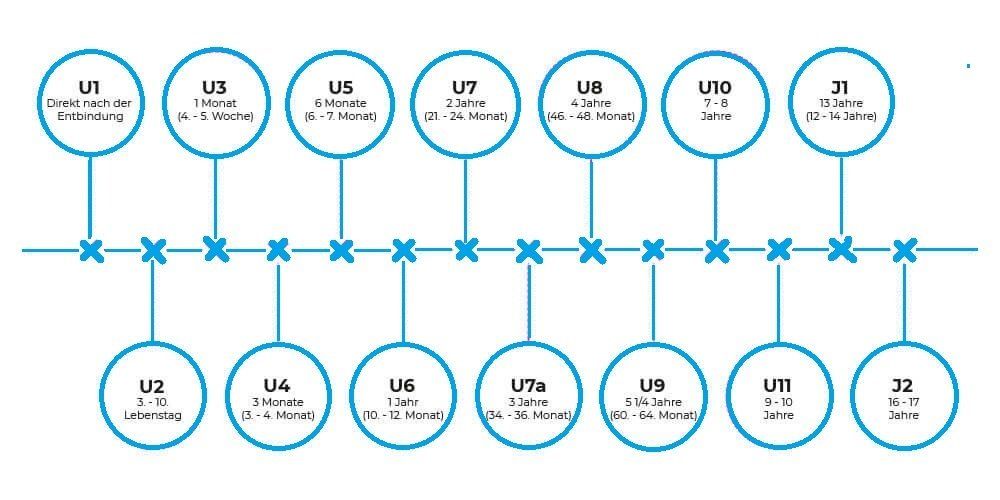precautions
"You know your children are growing up when they stop asking where they came from and refuse to say where they are going." PJ O'Rourke
Child health check-ups are designed to ensure that defects and illnesses in your child, especially those that pose a particular risk to normal physical and mental development, are identified as quickly as possible so that appropriate treatment can be initiated at an early stage. Child health check-ups are documented in the child health check-up booklet (the "yellow booklet").

Here is an overview (from U3):
U 3
4th-6th week of life
U3 is usually the first examination I carry out. Checking of body functions, hearing and the so-called newborn examination screening.
U 4
3rd-4th month of lifeIn the following examinations (up to U7), the main focus is on the child's timely physical development in order to detect cerebral movement disorders, for example. It is important to talk to me about timely vaccinations.
U 5
6th-7th month of life
U 6
10th-12th month of life
U 7
21st to 24th month of life
U 7a
3 years
The costs are not (yet) covered by some statutory health insurance companies. The U7a is essentially about identifying and initiating treatment for allergic diseases, socialization and behavioral disorders, obesity, speech development disorders, and dental, oral and jaw abnormalities.
U 8
3.5 - 4 years
During the U8, the child's mobility and coordination skills as well as reflexes, muscle strength, pronunciation and dental status are examined.
U 9
5 years
The U9 takes place in the year before school starts and is therefore particularly important. It includes tests for coordination skills (gross and fine motor skills), language comprehension, and hearing and vision.
U 10
7th-8th year of life
The costs are not (yet) covered by some statutory health insurance companies. The U10 and U11 are intended to close the gap between U9 (at around 5 years of age) and J1 (at around 12 to 14 years of age). Focus: Recognition and initiation of treatment of specific developmental disorders (e.g. reading, writing and arithmetic disorders), disorders of motor development and behavioral disorders (e.g. ADHD).
U 11
9th-10th year of life
The costs are not (yet) covered by some statutory health insurance companies. The focus of the U11 is on: identifying and initiating treatment for school performance problems, socialization and behavioral disorders, dental, oral and jaw abnormalities, and health-damaging media behavior. This examination is intended to promote exercise and sport, help identify and prevent problematic use of addictive substances, and also support health-conscious behavior (including nutrition, exercise, stress, addiction and media advice).
J 1
12-14 years
The penultimate examination in the "U series" is the J1 (youth health examination), which includes another check for posture abnormalities. In addition, the vaccination status, goiter prophylaxis, blood pressure, special family situations, school development, health behavior and motor skills are recorded. Puberty development and sexual behavior are discussed.
J 2
16th to 18th year of life
The costs are not (yet) covered by some statutory health insurance companies. The main focus of the last preventive examination J2 is: recognition and initiation of treatment of puberty and sexuality disorders, posture disorders, goiter formation, diabetes prevention, socialization and behavioral disorders. Accompanying advice on career choice.







